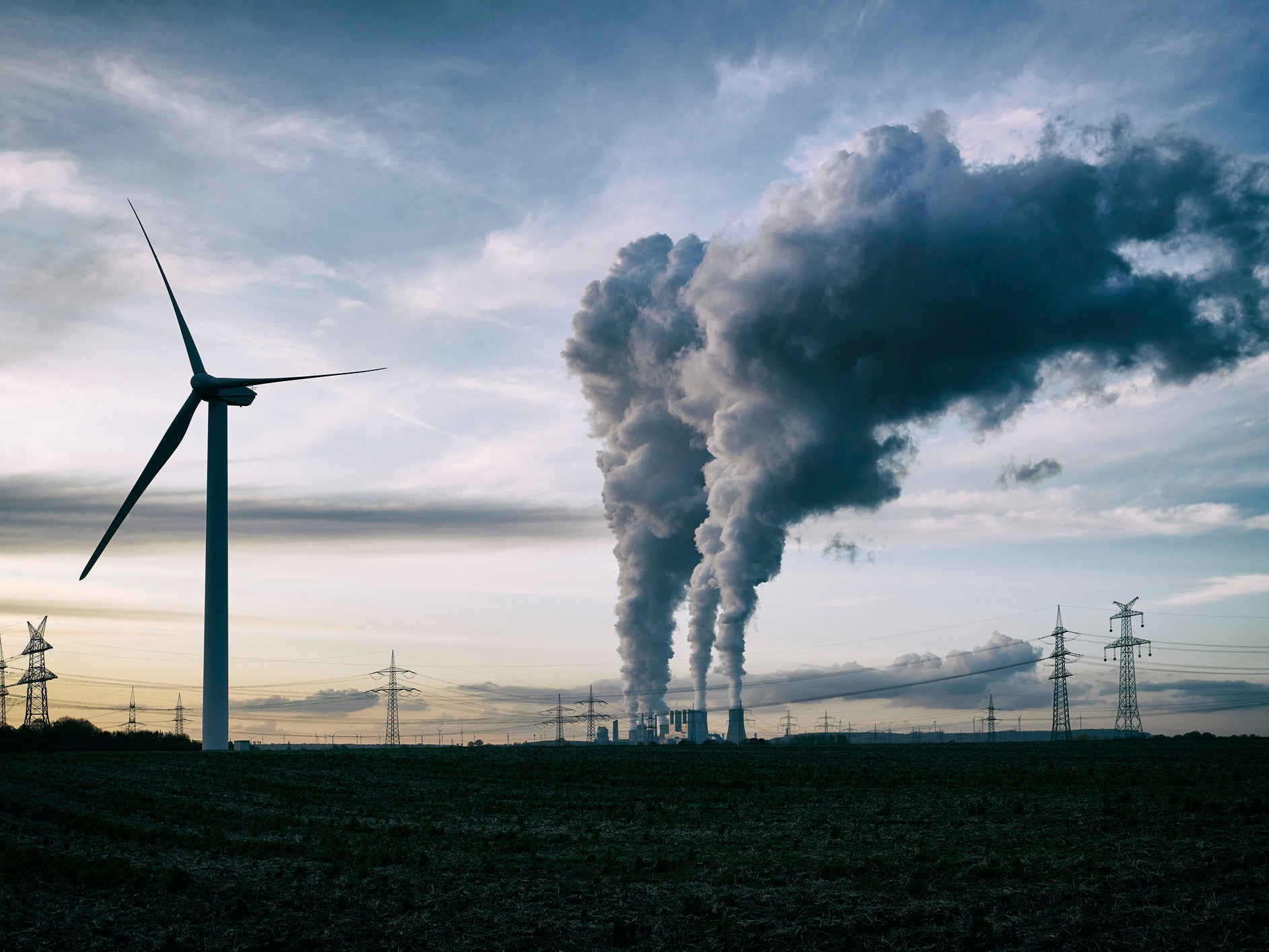Coronavirus crisis will cause 'terminal decline' of fossil fuel industry and turning point in climate crisis
One think tank claims oil, gas and coal profits could tumble by two-thirds – or $25 trillion – as pandemic catalyses falling demand and renewed push towards green energy. Ben Chapman reports


The coronavirus pandemic has pushed the fossil fuel industry into “terminal decline” as demand for oil and gas plunges while governments are spurred on to accelerate the transition to clean energy.
That’s the conclusion of new research which forecasts that 2020 could be a historic turning point in the fight against climate change.
Carbon Tracker, the think tank which authored the report, believes that advancing technology, falling renewable energy prices and a renewed push to implement climate-friendly policies are now bringing about the “decline and fall” of the fossil fuel system.
In a study published on Thursday, Carbon Tracker predicts that 2019 may turn out to be the year of peak fossil fuel production, with changes to the economy after the Covid-19 pandemic triggering a chain of events that will send oil, gas and coal companies into a downward spiral from which they will not recover.
It argues that this will mean that fossil fuel profits will be slashed by two-thirds below current estimates. As recently as 2018, the World Bank forecast that future oil and gas industry profits will total £39 trillion, but Carbon Tracker calculates that $25 trillion of that will now be wiped out.
Researchers found that if demand falls by 2 per cent per year in line with the Paris Agreement, future profits should be valued at $14 trillion.
That scenario is by no means certain but, the reports authors argue, the Covid-19 pandemic makes it more likely to become reality.
“We are witnessing the decline and fall of the fossil fuel system," said Kingsmill Bond, Carbon Tracker energy strategist and author of the report. "Technological innovation and policy support is driving peak fossil fuel demand in sector after sector and country after country, and the Covid-19 pandemic has accelerated this. We may now have seen peak fossil fuel demand as a whole.
“This is a huge opportunity for countries that import fossil fuels which can save trillions of dollars by switching to a clean energy economy in line with the Paris Agreement.
“Now is the time to plan an orderly wind-down of fossil fuel assets and manage the impact on the global economy rather than try to sustain the unsustainable.”
The situation requires rapid change to facilitate the shift to net-zero emissions, otherwise, in addition to rising temperatures and sea levels, trillions of dollars of economic value will be wasted, Mr Bond argues.
The report states that renewables are already the cheapest form of bulk energy production in 85 per cent of the world, and electric vehicle batteries are comparable in price with the cost of conventional car engines. Meanwhile, electricity companies are rapidly switching to renewables while car makers are shifting production to electric vehicles.
A number of governments have hinted they may try to stimulate their economies out of the coronavirus-induced recession by spending large sums on investing in the transition to clean energy.
In the UK, chancellor Rishi Sunak has so far refused to be drawn on whether he would announce any stimulus spending. However, the Financial Times reported this week that Downing Street insiders had said a package would be unveiled in July, without detailing what the money is likely to be spent on.
Carbon Tracker argues that there is now a strong imperative to facilitate the transition. It forecasts that abrupt changes to fossil fuel demand will send shockwaves through the wider economy and deliver a huge hit to global stock markets.
Companies either directly involved the fossil fuel business or heavily dependent on the energy it produces, such as shipping and aviation, account for a quarter of all publicly listed companies by value. Those values are now seen as being under more severe threat than ever before.
Countries dependent on fossil fuel revenues such as Saudi Arabia, Russia, Iraq, Iran, Nigeria and Venezuela are expected to be politically destabilised.
Conversely, the report said that this represents a huge opportunity to countries such as the UK which are net importers of fossil fuels and which collectively transfer around $2 trillion a year to petrostates.
Oil and gas importers now have a chance to take control of their energy supply and put an end to these transfers, Carbon Tracker said.
According to the International Energy Agency, demand for oil could fall by 9 per cent in 2020. Some fossil-fuel dependent industries such as aviation are forecast to experience lower demand for several years.
Despite this, and the need to slash emissions quickly to avert runaway climate change, companies and governments are investing £5 trillion a year in more capacity for the fossil fuel system, according to Carbon Tracker. The amount is roughly the same as the entire annual economic output of Japan - the world’s third largest economy.
The report argues argues that this means large amounts of money will be pumped into developing oilfields which are soon rendered useless and will have to be abandoned, a phenomenon known as stranded assets.
The scale of stranded assets will be far higher than previously predicted, the report forecasts.
Mr Bond warned investors: “There is far more risk inherent in the fossil fuel system than is conventionally priced into financial markets. Investors need to increase discount rates, reduce expected prices, curtail terminal values and account for the clean-up costs.”
Join our commenting forum
Join thought-provoking conversations, follow other Independent readers and see their replies
Comments